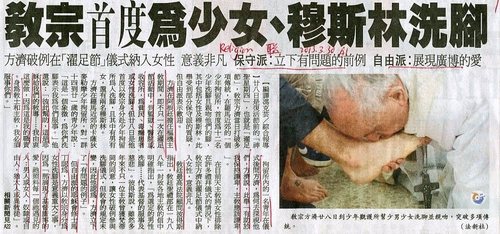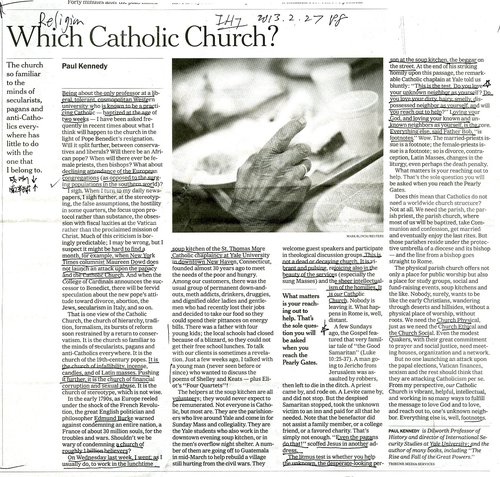20130330 教宗首度為少女、穆斯林洗腳
聯合報╱編譯馮克芸/綜合報導 2013.03.30
http://udn.com/NEWS/WORLD/WOR4/7798523.shtml#ixzz2PBSkLKYb
2013年3月28日,新任教宗方濟打破教廷傳統,為女性和回教徒犯人洗腳並俯身親吻之。這呼應了月前2月27日在紐約時報上國際關係大師 保羅˙甘迺迪所寫的短文。
在耶魯大學任教的甘迺迪教授(右圖)於1987年出版《大國的崛起和衰落》,預言了兩年後前蘇聯的解體,20年後美國國力開始下滑。
在短文中,他公開承認,他是西方非教會成立的、主要大學中唯一仍實際力行的天主教徒國際關係教授。他每周三為窮人、吸毒者、無家可歸者服務中餐。他寫道: 「你能愛你披頭散髮、骯髒、一無所有的鄰居如你愛你自己一樣? 這才是宗教的真髓,其他都是『腳註』。」
林中斌 2012年4月1日
On March 28, 2013, the newly elected Pope Francis washed and kissed the feet of two young female prisoners, one of them a Muslim, in a break with tradition. That echoed what Professor Paul Kennedy (see inset) of the The Rise and Fall of the Great Powers (1987) fame wrote on New York Times/International Herald Tribune on February 27, 2013.
Two years after the publication of his book, the once superpower the former Soviet Union collapsed, and two decades after, the other super power United States began its gradual decline.
Professor Kennedy at Yale University admitted that he was the only professor of international relations at a major western liberal university who was a practicing Catholic. Every Wednesday for many years, he had worked at the soup kitchen for the downtrodden neighbors. He wrote, “Do you love your dirty hairy, smelly, dispossessed neighbor as yourself, and will reach out to help? Loving your God, and loving your known and unknown neighbors as yourself, is the core. Everything else is footnotes.”
Chong-Pin Lin April 1, 2013


廿八日是復活節前的「神聖星期四」,也就是「濯足節」,教宗方濟當日打破多項傳統,在羅馬近郊的一個少年拘留所,首度為十二名少年洗腳且親吻他們的腳,其中包括女性及穆斯林。此舉受到部分保守派的質疑,但自由派表示歡迎。
方濟在阿根廷擔任樞機主教期間,即不只一次在濯足節活動中,到監獄、醫院或收容所,為貧民、毒癮患者或女性洗腳;但廿八日是他首度以教宗身分赴少年拘留所為人洗腳,且其中有男有女,還有兩名穆斯林。
方濟在羅馬近郊的卡薩狄麥勒摩少年拘留所,對一群十四到廿一歲的青少年說:「這是一個象徵,為你們洗腳表示我為你們服事。」他還說:「彼此幫助,這是耶穌給我們的教導……我由衷這麼做,因為這是我的職責。身為教士和主教,我必須服事你們。」
拘留所內的一名青年在儀式後問方濟,為何去探視他們,方濟說,此舉「有助於我保持謙卑,主教應該謙卑」。
在目前天主教將女性排除在許多禮拜儀式的情況下,教宗方濟在濯足節儀式中納入女性,意義非凡。
教廷最高法院顧問彼得斯指出,教廷聖禮部在一九八八年一封致各地主教的信中明確指出,「為選定的男性洗腳……代表基督的服事及慈悲」。彼得斯說,雖然多年來不只一位主教曾獲梵蒂岡的同意,讓女性破例參與洗腳儀式,但教會的規定未變,因此他認為,方濟立下了「有問題的例子」。
但自由派的耶穌會修士馬丁認為,方濟以教宗身分為女性洗腳是意義重大之事,因為「那展現了基督廣博的愛,祂照料每一個祂遇見的人:男人或女人,奴隸或自由人,猶太人或異教徒」。
Which Catholic Church?
The New York Times / Paul Kennedy / Feb 26, 2013
http://www.nytimes.com/2013/02/27/opinion/global/which-catholic-church.html?pagewanted=all
Being about the only professor at a liberal, tolerant, cosmopolitan Western university who is known to be a practicing Catholic — baptized at the age of two weeks — I have been asked frequently in recent times about what I think will happen to the church in the light of Pope Benedict’s resignation. Will it split further, between conservatives and liberals? Will there be an African pope? When will there ever be female priests, then bishops? What about declining attendance of the European congregations (as opposed to the surging populations in the southern world)?
I sigh. When I turn to my daily newspapers, I sigh further, at the stereotyping, the false assumptions, the hostility in some quarters, the focus upon protocol rather than substance, the obsession with fiscal laxities at the Vatican rather than the proclaimed mission of Christ. Much of this criticism is boringly predictable; I may be wrong, but I suspect it might be hard to find a month, for example, when New York Times columnist Maureen Dowd does not launch an attack upon the papacy and the Catholic Church. And when the College of Cardinals announces the successor to Benedict, there will be fervid speculation about the new pope’s attitude toward divorce, abortion, the Jews, secularism in Italy, and so on.
That is one view of the Catholic Church, the church of hierarchy, tradition, formalism, its bursts of reform soon restrained by a return to conservatism. It is the church so familiar to the minds of secularists, pagans and anti-Catholics everywhere. It is the church of the 19th-century popes. It is the church of infallibility, incense, candles, and of Latin masses. Pushing it further, it is the church of financial corruption and sexual abuse. It is the church of stereotype, which is not wise.
In the early 1790s, as Europe reeled under the shock of the French Revolution, the great English politician and philosopher Edmund Burke warned against condemning an entire nation, a France of about 30 million souls, for the troubles and wars. Shouldn’t we be wary of condemning a church of roughly 1 billion believers?
On Wednesday last week, I went, as I usually do, to work in the lunchtime soup kitchen of the St. Thomas More Catholic chaplaincy at Yale University in downtown New Haven, Connecticut, founded almost 30 years ago to meet the needs of the poor and hungry. Among our customers, there was the usual group of permanent down-and-outs, meth addicts, drinkers, druggies, and dignified older ladies and gentlemen who had recently lost their jobs and decided to take our food so they could spend their pittances on energy bills. There was a father with four young kids; the local schools had closed because of a blizzard, so they could not get their free school lunches. To talk with our clients is sometimes a revelation. Just a few weeks ago, I talked with a young man (never seen before or since) who wanted to discuss the poems of Shelley and Keats — plus Eliot’s “Four Quartets”!
The helpers at the soup kitchen are all volunteers; they would never expect to be remunerated. Not everyone is Catholic, but most are. They are the parishioners who live around Yale and come in for Sunday Mass and collegiality. They are the Yale students who also work in the downtown evening soup kitchen, or in the men’s overflow night shelter. A number of them are going off to Guatemala in mid-March to help rebuild a village still hurting from the civil wars. They welcome guest speakers and participate in theological discussion groups. This is not a dead or decaying church. It is vibrant and pulsing, rejoicing also in the beauty of the services (especially the sung Masses) and the sheer intellectualism of the homilies. It is our Catholic Church. Nobody is leaving it. What happens in Rome is, well, distant.
A few Sundays ago, the Gospel featured that very familiar tale of “the Good Samaritan” (Luke 10:25-37). A man going to Jericho from Jerusalem was assaulted by robbers, then left to die in the ditch. A priest came by, and rode on. A Levite came by, and did not stop. But the despised Samaritan stopped, took the unknown victim to an inn and paid for all that he needed. Note that the benefactor did not assist a family member, or a college friend, or a favored charity. That’s simply not enough. “Even the pagans do that!” scoffed Jesus in another address.
The litmus test is whether you help the unknown, the desperate-looking person at the soup kitchen, the beggar on the street. At the end of his striking homily upon this passage, the remarkable Catholic chaplain at Yale told us bluntly: “This is the test. Do you love your unknown neighbor as yourself? Do you love your dirty, hairy, smelly, dispossessed neighbor as yourself, and will you reach out to help?” Loving your God, and loving your known and unknown neighbors as yourself, is the core. Everything else, said Father Bob, “is footnotes.” Wow. The married-priests issue is a footnote; the female-priests issue is a footnote; so is divorce, contraception, Latin Masses, changes in the liturgy, even perhaps the death penalty.
What matters is your reaching out to help. That’s the sole question you will be asked when you reach the Pearly Gates.
Does this mean that Catholics do not need a worldwide church structure? Not at all. We need the parish, the parish priest, the parish church, where most of us will be baptized, take Communion and confession, get married and eventually enjoy the last rites. But those parishes reside under the protective umbrella of a diocese and its bishop — and the line from a bishop goes straight to Rome.
The physical parish church offers not only a place for public worship but also a place for study groups, social and fund-raising events, soup kitchens and the like. Nobody, surely, wants to be like the early Christians, wandering through deserts and hillsides, without a physical place of worship, without roots. We need the Church Physical, just as we need the Church Ethical and the Church Social. Even the modest Quakers, with their great commitment to prayer and social justice, need meeting houses, organization and a network.
But no one launching an attack upon the papal elections, Vatican finances, sexism and the rest should think that they are attacking Catholicism per se. From my perspective, our Catholic Church is vibrant, helpful, intellectual, and working in so many ways to fulfill the message to love God and to love, and reach out to, one’s unknown neighbor. Everything else is, well, footnotes.
Paul Kennedy is Dilworth Professor of History and director of International Security Studies at Yale University; and the author of many books, including “The Rise and Fall of the Great Powers.”
TRIBUNE MEDIA SERVICES


 留言列表
留言列表


